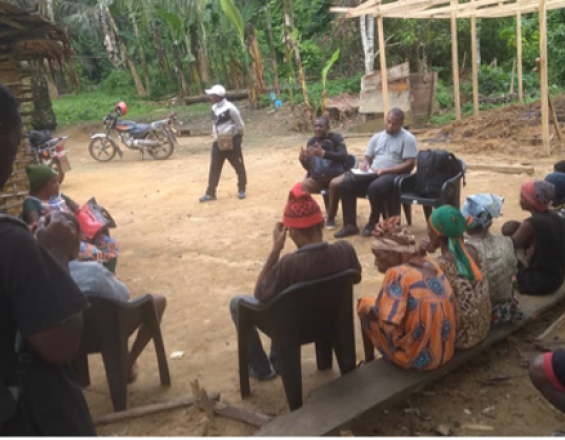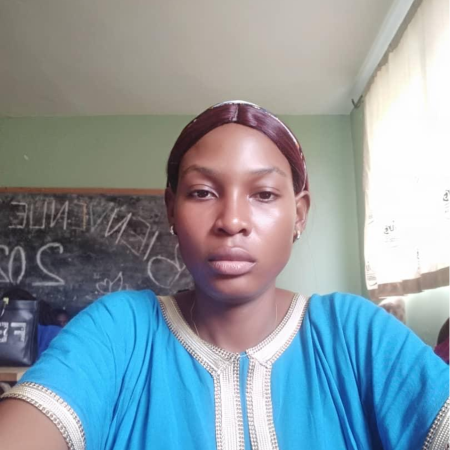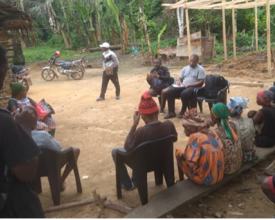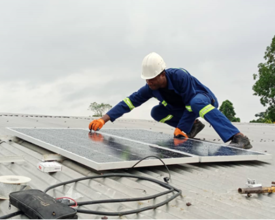
Climate mitigation using renewable energy through participatory approaches in Bipindi, Cameroon

The "Strengthening Access to Solar Energy for the Bagyeli Indigenous Communities" project in South Cameroon addresses the Bagyeli's climate change challenges, such as variable rainfall and temperature, which affect their livelihoods. These communities face poverty and vulnerability due to limited access to electricity, impacting education, health, and quality of life. This initiative aims to enhance their resilience by increasing solar energy access, building capacity in solar system maintenance, and raising climate change awareness. Beneficiaries include 500 people and 200 students, primarily women and youth. Expected outcomes include improved solar capacities in schools, enhanced youth skills, solar installations in community centers, and solar kits for 50 families, benefiting over 300 Bagyeli individuals.
Contexto
Défis à relever
The use of fossil fuels for cooking and lighting leads to deforestation and greenhouse gas emissions. The project promotes solar energy, a renewable and clean alternative, reducing deforestation and mitigating climate change.
There is a lack of awareness about climate change and renewable energy benefits. The project includes educational initiatives to raise awareness and prepare the communities for climate resilience. By training young Bakola/Bagyeli individuals in solar energy installation and maintenance, the project empowers them with valuable skills, enhancing their employability and self-sufficiency.
The communities face significant economic hardships and rely heavily on external energy providers. The project aims to alleviate poverty by providing training that enables the youth to secure jobs in the solar energy sector, fostering financial independence. Developing local expertise reduces reliance on costly external providers, making energy solutions more sustainable and affordable.
Ubicación
Procesar
Summary of the process
Community Engagement and Local Knowledge: Engaging local members and leveraging their expertise are crucial for accurately identifying challenges and choosing strategic locations for solar panel installation. Active participation ensures that solutions are relevant, culturally appropriate, and effective, leading to more successful interventions.
Capacity Building and Awareness Raising: Training local youth in solar technology not only builds technical skills but also enhances climate mitigation and adaptation efforts. By educating the community and youth, the project fosters a knowledgeable base that supports the adoption and maintenance of solar energy systems.
Technical Expertise and Infrastructure Development: The involvement of solar technology experts ensures the selected sites are technically viable, while infrastructure development supports successful implementation. These elements work together to ensure the project is both technically sound and practically feasible.
Ongoing Dialogue and Feedback Mechanisms: Continuous community dialogue and feedback refine strategies throughout the project. This iterative process keeps solutions responsive to evolving needs, maximizing effectiveness and sustainability.
Building Blocks
Identify the problem in the community with the community leading the process
The purpose of this building block is to empower communities to identify and address local issues through a participatory, community-led process. By involving the community in problem identification, the approach ensures solutions are relevant, culturally appropriate, and sustainable. This method fosters ownership, encouraging long-term commitment and effective implementation of solutions tailored to the community's unique needs. This is done with the involvement of traditional leaders.
Enabling factors
- Community Engagement: Active participation from community members ensures that solutions are relevant and culturally appropriate.
- Local Knowledge: Incorporating local expertise helps identify suitable sites and needs for solar panel installation.
- Capacity Building: Providing training and resources for installation and maintenance enhances local skills and ensures long-term sustainability.
- Supportive Infrastructure: Ensuring infrastructure is in place for project execution.
Lesson learned
Engaging local members ensures accurate problem identification and relevant solutions, while leveraging community expertise provides deeper insights. Building trust through transparency and consistent communication, along with ongoing dialogue, helps adapt solutions to evolving needs, ensuring effective and responsive community-driven interventions.
Creating community led committees to ensure participatory approaches are implemented
Creating community-led committees ensures participatory approaches by involving local members in decision-making. These committees empower communities to actively engage in project planning, implementation, and monitoring, fostering ownership and accountability. This approach enhances relevance, cultural alignment, and sustainability, ensuring that solutions are effectively tailored to the community's specific needs and priorities. Community members would be chosen through election in their local language.
Enabling factors
- Inclusive Representation: Ensure that committees include diverse community members to reflect various perspectives and needs.
- Effective Communication: Establish channels for open and transparent communication within the committee and with the broader community.
- Supportive Leadership: Engage local leaders and influencers to endorse and support the committee’s efforts.
- Regular Meetings and Feedback: Schedule regular meetings and feedback sessions to monitor progress and make adjustments as needed.
- Clear Objectives: Define the committee's goals and roles clearly to guide effective participation and decision-making.
Lesson learned
Community engagement is vital for a project to be successful . Involving the community throughout, using a participative approach is at the core of the success and sustainability of the project.
Raising awareness about climate mitigation and adaptation
Raising awareness about climate mitigation and adaptation involves educating communities on the causes and impacts of climate change, promoting sustainable practices, and encouraging proactive measures. By increasing knowledge and understanding, communities can adopt strategies to reduce emissions, protect natural resources, and enhance resilience against climate-related challenges, ensuring long-term environmental sustainability.
Enabling factors
- Education and Training: Provide targeted education and training programs to enhance understanding of climate mitigation and adaptation strategies.
- Accessible Information: Ensure that climate information is easily accessible and understandable for all community members.
- Effective communication tools : such as radio, flyers to bring awarenes to communities using mutliple communications platoforms and tools
- Monitoring and Feedback: Establish mechanisms to assess the impact of awareness efforts and gather feedback for continuous improvement.
- Community engagement
Lesson learned
- Engage Local Leaders: Involve community leaders to endorse and support climate awareness efforts, enhancing credibility and outreach.
- Tailored Messaging: Customize climate information to match the community’s local context and understanding to improve engagement and relevance.
Identifying with the communities strategic locations for solar panel implementation
Identifying strategic locations for solar panel implementation with communities involves assessing areas with high sunlight exposure and low shading. Engaging local members ensures that sites are selected based on practical needs, accessibility, and minimal disruption. This collaborative approach optimize's energy efficiency and aligns solar installations with community priorities.
Enabling factors
- Community Involvement: Engage local members in identifying potential locations to ensure sites meet practical and cultural needs.
- Site Assessments: Conduct thorough assessments of sunlight exposure, land use, and shading to determine optimal locations.
- Local Knowledge: Leverage the community’s knowledge of the area for selecting suitable and accessible sites.
- Technical Expertise: Involve experts in solar technology to evaluate and validate chosen locations.
- Access to Resources: Ensure availability of necessary tools and technology for site evaluation and installation.
- Infrastructure: Verify that selected locations have or can be developed with the required infrastructure for solar panel deployment.
- Regulatory Compliance: Adhere to local regulations and obtain necessary permits for site selection and installation.
Lesson learned
- Site Assessments: Conduct detailed assessments of sunlight exposure, land use, and shading to determine optimal sites.
- Utilize Local Knowledge: Leverage community expertise to identify potential sites based on local conditions and needs.
- Technical Evaluation: Involve solar technology experts to validate site suitability and ensure technical feasibility.
- Community Feedback: Regularly gather and incorporate feedback from the community to address any concerns and adjust plans as needed.
Impacts
Environmental Impact: Reduction in Fossil Fuel Dependence: By shifting to solar energy, the project reduces reliance on fossil fuels, which are major contributors to deforestation and air pollution. This transition helps in cutting down greenhouse gas emissions and mitigating climate change.
Conservation of Natural Resources: Solar energy reduces the need for firewood, preserving forests and protecting local biodiversity.
Social Impact: Capacity Building: Training 50 young Bakola/Bagyeli in solar panel installation and maintenance enhances their skills, leading to greater community resilience and adaptation to climate change. This training also creates job opportunities in the growing solar energy sector.
Increased Awareness: Educating the community about climate change and sustainable practices promotes environmental stewardship and improves adaptive capacity.
Economic Impact: Cost Savings: Reducing dependence on firewood lowers household energy costs and increases financial stability for local families.
Beneficiaries
- The Bakola/Bagyeli communities
- Youth participants trained
- Local ecosystems, preservation of local forests & biodiversity
- Wider community, increased awareness and adoption of renewable energy practices
Sustainable Development Goals
Story

Mimbiang Ghislaine, a young Bagyeli woman from the village of Bouara Bouara in the Lokoundje region, faced the challenges of early marriage. Despite these obstacles, she persevered and is now a proud holder of a High National Diploma (HND) in Organizational Communication. This achievement was made possible through the financial support and guidance provided by the Fondation pour l'Environnement et le Développement au Cameroun (FEDEC). Ghislaine’s journey is a testament to the transformative power of education and the impact of targeted support for vulnerable communities. Her story not only inspires hope but also underscores the importance of empowering women and youth through education and sustainable development initiatives.






